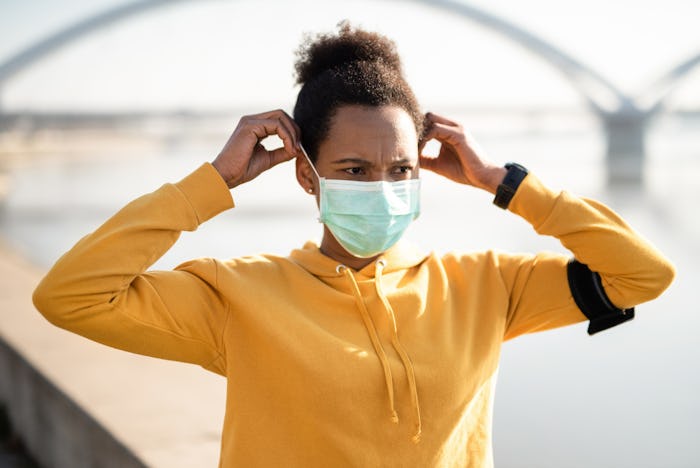Life

Here's What To Do If Your Face Mask Is Messing With Your Skin, According To Dermatologists
If you haven’t gotten the hang of wearing a face mask outside, you’re not alone. They slip, they slide, and they’re just plain uncomfortable. But like them or not, face masks are a part of life at the moment. Understanding how to avoid face mask irritation might not make it fun to wear one, but it can certainly make the process less unpleasant — and scratchy.
"Virtually all skin types will see some form of irritation from wearing a face mask, if they are wearing them for extended amounts of time each day," Westport, CT-based dermatologist Deanne Mraz Robinson, M.D., FAAD, tells Romper.
"Many people see irritation from the physical friction and/or pressure of the material on their skin, while others will see acne pop up," she adds. "Masks trap moisture, sweat, oil and dirt close to our skin."
That's why it's important for your skin to be as clean as possible before you put on your mask, Rina Allawh, M.D., FAAD, a dermatologist in King of Prussia, PA, tells Romper. Dr. Allawh recommends prepping your skin by using a gentle cleanser prior to applying the face mask. "It can effectively remove any oily residue and debris from your face that may interact with ingredients in the mask that can irritate and clog your pores,” she says. "Keeping clean is the most important thing you can do," agrees Dr. Robinson, who also recommends washing your face after you take your mask off and skipping makeup in the area where your mask fits.
When it comes to the mask itself, what it's made of can make a huge difference. “It’s best to avoid using masks made of harsh or synthetic fabrics,” Jeffrey Fromowitz, M.D., FAAD, a dermatologist in Boca Raton, FL. tells Romper. “The best choice of masks for your skin would be a multi-layer cotton mask with a filter inserted between the layers.” Of course, depending on your line of work, a cloth mask might not be an option. "Medical professionals and first line responders who are wearing tightly fitted N95s will see more severe irritation in the form of abrasions, bruising and infection versus the fabric ones most other people pop on and off throughout their day," says Dr. Robinson.
Other materials present in your mask can pose a problem, too, as Adam Mamelak, M.D., a dermatologist in Austin, TX tells Romper. “Some masks may contain metal or rubber that can cause a contact dermatitis and irritate the skin,” he warns. So if you don't have to wear a medical grade mask, it's worth checking to make sure the mask you purchase is free of potential irritants like these.
If you’re wearing a disposable mask, the most important thing is to toss it into the trash after using it, since they’re not meant to be worn more than once, advises the U.S. Food & Drug Administration. If you're wearing a cloth mask, you need to wash it frequently. “Failing to do so can increase dirt and oils on the skin and lead to increased skin irritation and rashes," says Dr. Fromowitz. It's best to wash your mask daily with a "gentle, fragrance free laundry detergent," according to Dr. Robinson, who also suggests having "a few masks in rotation so one is always clean and ready to grab." Make sure your hands are clean when putting on (or taking off) the mask, either by washing them or using hand sanitizer.
Should you end up experiencing some irritation, there are ways to treat it. Depending on the type of reaction you have to your mask, certain products can help to stop the cycle, as Dr. Robinson explains. If your irritation is from the friction of the mask, try applying a barrier cream such as Vanicream Moisturizing Ointment ($8, Amazon) sparingly "along the edges where the mask is most tightly fitted." The cleanser you use should be a gentle one like Alastin Gentle Cleanser ($45, Alastin), and "soothing products" like Avene's Cicalfate Restorative Skin Cream ($28, Avene USA) and SkinCeuticals Triple Lipid Restore 2:4:2 anti-aging cream ($128, SkinCeuticals), which will "hydrate, repair and support the skin's barrier function," she explains.
If, on the other hand, your irritation is taking the form of acne, then Dr. Robinson recommends stronger cleansers including CLn Acne Cleanser ($28, CLn Wash) or PanOxyl ($10, Amazon). She also suggests exfoliating two to three times a week with a chemical exfoliant such as Skin Better AlphaRet Exfoliating Peel Pads (only available through authorized physicians).
And finally, if none of the above does the trick, consider calling a professional. “Your dermatologist might even recommend a prescription medication to help control this as well," says Dr. Mamelak.
Then, when you take off your mask, your skin will be gorgeous and glowing again.
Experts:
Deanne Mraz Robinson, M.D., FAAD, dermatologist in Westport, CT
Rina Allawh, M.D., FAAD, dermatologist in King of Prussia, PA
Jeffrey Fromowitz, M.D., FAAD, dermatologist in Boca Raton, FL
Adam Mamelak, M.D., dermatologist in Austin, TX
This article was originally published on